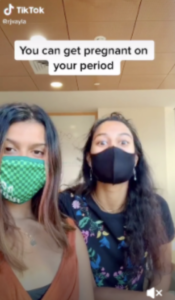
Blog Post 2
Interning with VAYLA New Orleans, this semester, has taught me a lot about the current cultural intricacies of sex education. As part of our initiative, Rajvi Kumar and I decided to start a TikTok to create videos with snippets of information surrounding reproductive justice. The first TikTok we made was on debunking common myths about sex. The night we published it, the video went viral. Now it has over 1.5 million views. Unfortunately, the reason it spread so quickly was not because people liked the message we were spreading. Instead they focused on questioning every fact. Although, we believed the content we were sharing was self-explanatory, most of the comments questioned the facts we listed. Additionally, many of the people who commented mentioned our looks and asked about our sex lives as opposed to engaging with the actual information we in the video. We felt as though we were being personally targeted. Although there was some positive discourse on a few of the myths, we were concerned that people, even adults, were questioning these facts that should be taught in school.
The response to the video was so negative, we decided to post a clarification video explaining some of the scientific reasoning behind the information we shared. Unfortunately, because it seemed to be less controversial, this video did not gain the traction our first one did. It reminded me how information that we consume through media feeds can truly be misinterpreted. Though our video was fact-checked, it was grouped into a category where anyone can post anything. This likely decreased the credit it was given. Conversely, It reminds me that we also need to be wary of information on public streaming sites. Knowing your sources is imperative. It is increasingly necessary to do individual research and find scholarly sources on sex education. There is far too much misinformation circulating on these platforms. I am grateful that VAYLA has exposed me to this type of response and hope those who saw our video are curious enough to do some research for themselves.
Sincerely,
Maya Jammulapati
